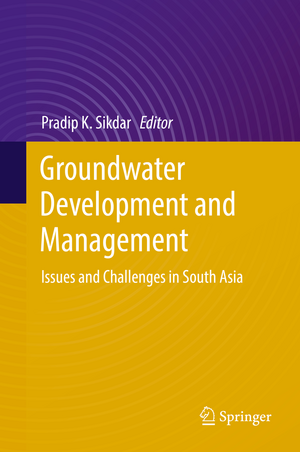Groundwater Development and Management: Issues and Challenges in South Asia
Editat de Pradip K. Sikdaren Limba Engleză Hardback – 14 aug 2018
This book is relevant for academics, professionals, administrators, policy makers, and economists concerned with various aspects of groundwater science and management.
Preț: 562.89 lei
Preț vechi: 694.93 lei
-19% Nou
Puncte Express: 844
Preț estimativ în valută:
107.71€ • 112.69$ • 89.47£
107.71€ • 112.69$ • 89.47£
Carte tipărită la comandă
Livrare economică 29 martie-04 aprilie
Preluare comenzi: 021 569.72.76
Specificații
ISBN-13: 9783319751146
ISBN-10: 331975114X
Pagini: 270
Ilustrații: XIV, 539 p. 171 illus., 22 illus. in color.
Dimensiuni: 155 x 235 mm
Ediția:1st ed. 2019
Editura: Springer International Publishing
Colecția Springer
Locul publicării:Cham, Switzerland
ISBN-10: 331975114X
Pagini: 270
Ilustrații: XIV, 539 p. 171 illus., 22 illus. in color.
Dimensiuni: 155 x 235 mm
Ediția:1st ed. 2019
Editura: Springer International Publishing
Colecția Springer
Locul publicării:Cham, Switzerland
Cuprins
1 Problems and Challenges for Groundwater Management in South Asia.- 2 Problems and Challenges for Groundwater Management in India.- 3 Modelling of Aquifer Systems.- 4 Application of Geophysical Techniques in Groundwater Management.- 5 Application of Remote Sensing and GIS.- 6 Application of Environmental Isotopes.- 7 Development and Management of Coastal Aquifer Systems.- 8 Spring Protection and Management.- 9 Drilling, Well Construction and Well Development.- 10 Pumping Test for Aquifers: Analysis and Evaluation.- 11 Fluoride Pollution in Groundwater.- 12 Arsenic Pollution in Groundwater.- 13 Arsenic Contaminated Irrigation Water and Its Impact on the Food Chain.- 14 Human Health Hazards Due to Arsenic and Fluoride Contamination in Drinking Water and the Food Chain.- 15 Treatment of Arsenic and Fluoride Contaminated Groundwater.- 16 Impact of Climate Change and Groundwater.- 17 Rainwater Harvesting and Artificial Recharging.- 18 Development and Management of Baseflow for Public WaterSupply in Semi-Arid Hard Rock Area.- 19 Groundwater Policies and Law.- 20 Catalysing Peoples' Participation for Groundwater Management.- 21 Way Forward and Future Strategies.
Notă biografică
Professor Pradip K. Sikdar received his education at the University of Calcutta, India (Geology/Hydrogeology) and the University of Newcastle-upon-Tyne, UK (Integrated Coastal Zone Management). A teacher by profession and hydrogeologist by education, he was a Senior Scientist and Executive Secretary at the Centre for Study of Man and Environment, Kolkata and a Lecturer at the Department of Applied Geology, Indian School of Mines, Dhanbad before joining the Indian Institute of Social Welfare and Business Management at the Department of Environment Management in 2000. Currently as a Professor at the Department of Environment Management he is actively engaged in research and teaching of groundwater hydrology and environmental impact assessment. He has over 28 years of experience in project management and implementation, field and research work of groundwater systems including application of computer models in scientific evaluation of hydrogeologic systems, groundwater resources development and protection. He also provides technical and management advice on a wide range of subjects dealing with watershed management, natural resource development and environmental management issues to industries, consultant groups and NGOs. He is currently active in arsenic research and his primary interest in arsenic is to explain the spatial distribution of As-pollution in the groundwater of the Bengal Basin. His present research also deals with the sustainability of water supply in the fluoride affected and semi-arid regions of West Bengal and the design of groundwater abstraction structures.
Textul de pe ultima copertă
This book deals with the challenges for efficient groundwater management, with a focus on South Asia and India, providing a balanced presentation of theory and field practice using a multidisciplinary approach. Groundwater of South Asia is increasingly confronted with overuse and deteriorating quality and therefore requires urgent attention. Management of the stressed groundwater systems is an extremely complex proposition because of the intricate hydrogeological set-up of the region. Strategies for sustainable management must involve a combination of supply-side and demand-side measures depending on the regional setting and socio-economic situations. As a consequence, the challenges of efficient groundwater management require not only a clear understanding of the aquifer configuration, but also demand for the development of a comprehensive database of the groundwater occurrences and flow systems in each hydrogeological setting. In addition, drilling and well construction methods that are appropriate to different hydrogeological formations need to be implemented as well as real-time monitoring of the status of the groundwater use. Also corrective measures for groundwater that is threatened with depletion and quality deterioration need to be installed. Finally, the legal framework of groundwater needs to be rearticulated according to the common property aspect of groundwater. These challenges should revolve around effective groundwater governance by creating an atmosphere to support and empower community-based systems of decision-making and revisit the existing legal framework and groundwater management institutions by fostering community initiatives.
This book is relevant for academics, professionals, administrators, policy makers, and economists concerned with various aspects of groundwater science and management.
This book is relevant for academics, professionals, administrators, policy makers, and economists concerned with various aspects of groundwater science and management.
Caracteristici
Broadens the reader's understanding of groundwater science and management Maximizes the reader's insights of the management aspects of groundwater Reviews the key recent research on groundwater science and investigation Includes case studies that illustrate new trends in groundwater research and techniques of artificial recharging and treatment of contaminated groundwater Summarises the latest studies on management of groundwater in different hydrogeological frameworks
